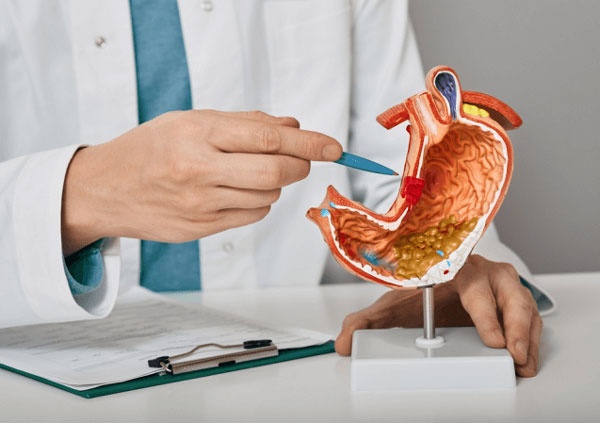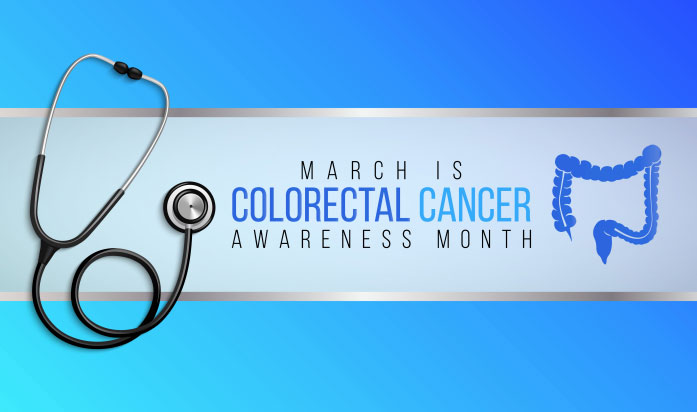March is Colorectal Cancer Awareness Month. This disease is one of the most prevalent cancers affecting Americans. Luckily, if caught early, there are plenty of treatment options available and there is a high chance of a complete recovery. However, if caught when it is at an advanced stage, the treatment options are limited. It is imperative that you have routine screenings to identify polyps so that you can nip cancer in the bud, literally!
There are also lifestyle changes that you can make that can reduce the risk of developing colorectal cancer. These changes include eating less processed meats, consuming a highfiber diet full of fruits and vegetables, avoiding excessive alcohol consumption and tobacco use, and exercising frequently.
If you would like to know the factors, symptoms, and treatment plans for colorectal cancer, check out our newest blog post or visit our colonoscopy page. You can also head over to our website to schedule your preventative screening.
Provider Spotlight
We are excited to welcome an amazing new provider to the GSG team! Dr. Deepshikha Nag Chowdhury

Dr. Chowdhury completed her Internal Medicine residency from Mount Sinai School of Medicine – St. Joseph’s University Hospital, NJ, at the end of which she was elected Chief Resident.
Subsequently, she completed a Gastroenterology and Hepatology fellowship from New York Medical College at St. Joseph’s University Hospital, NJ. She has a special interest in colorectal cancer screening, gastrointestinal cancers, biliary disease and inflammatory bowel disease. She is also trained and certified to perform ERCPs (Endoscopic Retrograde Cholangiopancreatography).
Fluent in English, Bengali and Urdu/Hindi, she has authored several publications on varied topics in many peer-reviewed journals and is an active member of the American College of Gastroenterology, American Gastroenterological Association and the American Society of Gastrointestinal Endoscopy.
Dr. Chowdhury is board certified in Internal Medicine and Gastroenterology.
Patient Education

Gastrointestinal Infections
Many of us experience GI discomfort from time to time that makes our gut feel a little shakier than normal. While this can sometimes be attributed to GI conditions like GERD and IBS, there is also the chance that you could be experiencing a gastrointestinal infection.
Sometimes referred to as bowel infections or gastroenteritis, gastrointestinal infections can be caused by viruses, parasites, and bacteria that have found their way into your gut. They are usually accompanied by nausea, vomiting, diarrhea, and stomach pain. These symptoms normally get better within one or two days.
Some of the most common viruses that cause gastrointestinal infections include:
- Norovirus – a highly contagious virus that can easily spread through places like daycare centers, cruise ships, and nursing homes.
- Rotavirus – spread through contaminated vomit or feces and is common in young children.
The bacteria that cause gastrointestinal infections include:
- Salmonella – spread through poultry, eggs, or meat.
- Campylobacter – often linked to eating contaminated chicken.
- Shigella – found in people who have recently traveled in developing countries.
Common parasites that can lead to GI infections include:
- Giardia – spread through the excrement of infected people and animals. Commonly found in travelers, hikers, and young children.
- Cryptosporidiosis – spread through contaminated food.
How do gastrointestinal infections spread?
You can get GI infections by consuming contaminated water or food, which is often referred to as food poisoning, or by coming into contact with contaminated objects like silverware, faucets, toys, or dirty diapers. You can get them both at home and while traveling and it is important to always be careful about what you consume no matter where you are.
When should you see a doctor?
If your symptoms are severe with diarrhea lasting more than two to three days or you develop a fever, blood or mucus in your stool, or are dehydrated, it is important to see your doctor who can prescribe antibiotics or other treatments as necessary. If children show these symptoms, they should be taken to the emergency department or a health clinic immediately.
How can you prevent gastrointestinal infections?
You can prevent gastrointestinal infections by practicing good hygiene and being careful with what you eat. Make sure to cook meat and eggs thoroughly, wash your hands regularly, and avoid having close contact with anyone who currently has a gastrointestinal infection.
To learn ways to avoid getting a gastrointestinal infection when traveling, make sure to check out our November blog post!
What Are Peptic Ulcers?

Peptic ulcers are open sores that begin to form on the inside lining of the upper portion of the small intestine and in the stomach. The ulcers inside the stomach are referred to as gastric ulcers while the ones within the small intestine are called duodenal ulcers.
The most common causes of peptic ulcers are actually bacterial infections caused by Helicobacter Pylori and by the long-term use of anti-inflammatory nonsteroidal drugs such as Advil, Motrin, and Aleve. While ulcers are commonly attributed to stress or spicy food, they do not directly cause them; however, they can make the symptoms more pronounced.
The most common symptoms of ulcers include:
- A burning pain in the stomach
- Nausea
- Heartburn
- Intolerance to fatty foods
- And a feeling of bloating or belching
The most commonly reported symptom is burning stomach pain which is often made worse by excess stomach acid or by having an empty stomach. Luckily, this means that the pain can often be relieved simply by eating foods that can buffer the stomach acid like whole grains and root vegetables, or by taking an acid-reducing medication like Tums or Rolaids which help neutralize the acid in the stomach.
What to eat
If you have recurrent stomach ulcers, a dietary change may be able to greatly decrease the frequency of them. It is a good idea to eat foods containing probiotics such as yogurt, kefir, tempeh, sauerkraut, and kimchi as well as blackberries and broccoli as they may be able to protect your stomach against ulcer-causing bacteria.
What to avoid
If you frequently experience peptic ulcers, you should avoid consuming coffee and caffeine, alcohol, and overly spicy or acidic foods. You should also try to decrease your daily stress levels.
When to contact your doctor
Although symptoms are generally mild, there are times when you should see a doctor. This includes any time that you experience vomiting, dark blood in stools, feel faint or nauseous, experience trouble breathing, or have unexplained weight loss.
How to Relieve Stress
Although stress is not the culprit behind stomach ulcers, they definitely make them feel worse. It is important that you try to limit your stress levels as they can have a very detrimental impact on your overall health and wellness.
A few ways that you can relieve stress include:
- Meditation
- Exercise
- Yoga and stretching
- Getting enough sleep
- Eating a balanced diet full of vitamins and minerals
- Take deep breaths
- Practice self-care techniques
Taking the time to include some of these activities in your daily habits can have a surprising impact on how you feel each day. We understand that it may feel like a monumental task but keep in mind that it takes as little as an extra 10-15 minutes to feel the health benefits of many of these and on average, it only takes around two months of doing an activity routinely to make it become automatic behavior. The resulting decrease in stress levels and the resulting increase in productivity that is likely to ensue will certainly make it worth the time invested!
Office Updates

We are happy to share that our new building at 50 Michels Way in Londonderry is nearing completion. We are expecting to be occupying the new space in May!
Just a reminder, GSG is no longer at the Derry location.
We have opened our temporary clinic right next door to the WorkOut Club in Londonderry for convenient care to our local area patients.
The address is 18 Orchard View Drive, Londonderry, NH. We are adjacent to the Shaw’s Plaza just after the AMC Movie Theater.
Please feel free to reach out with any questions.

